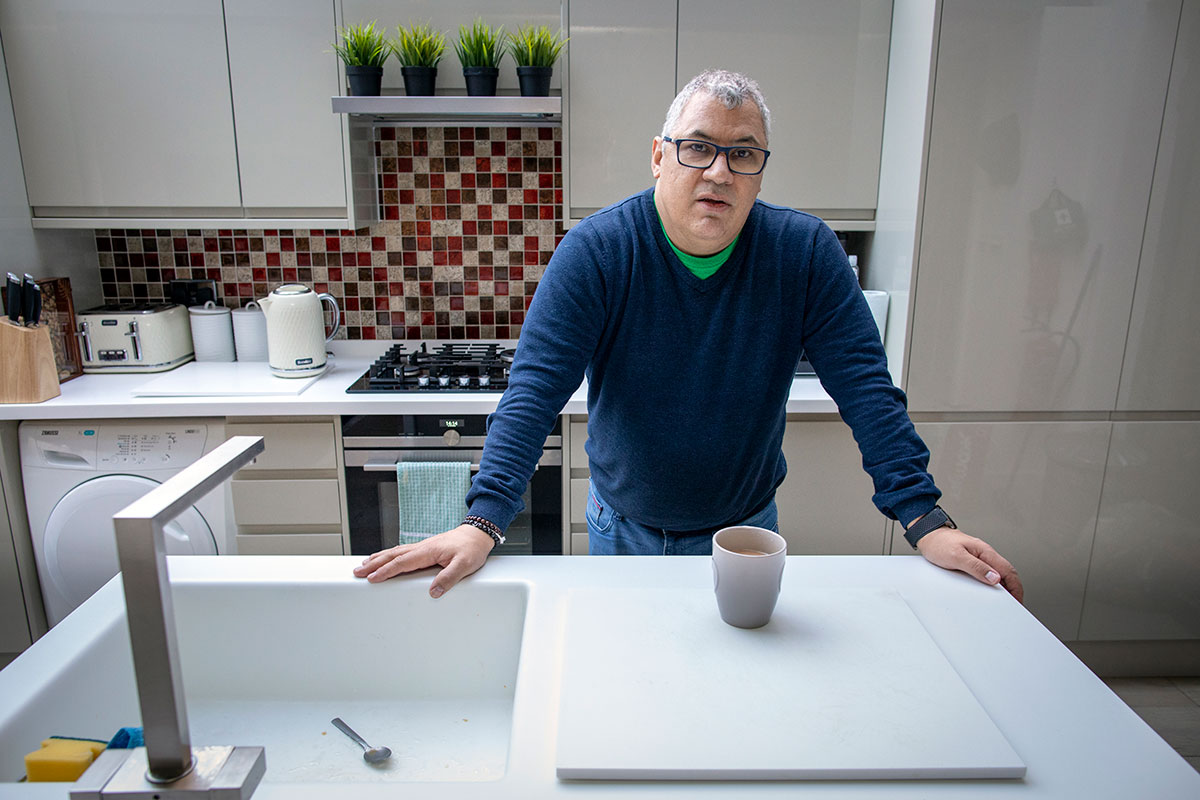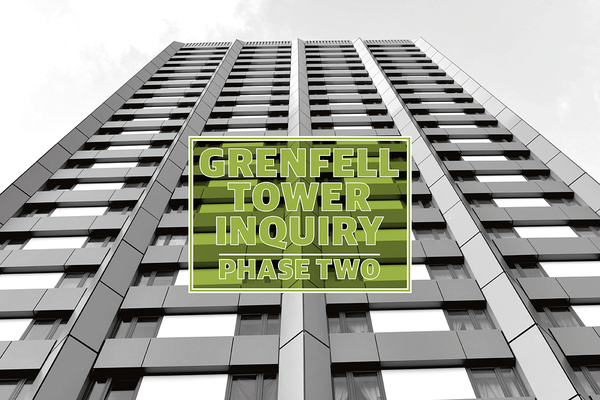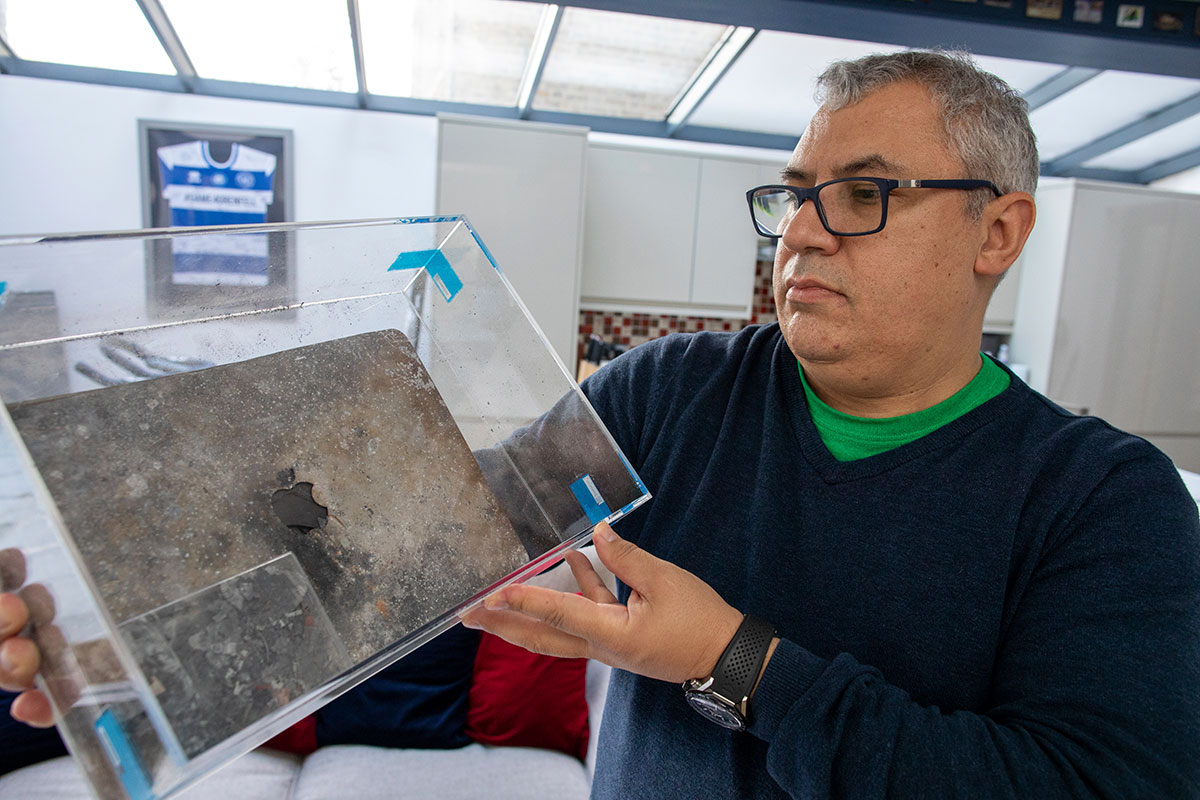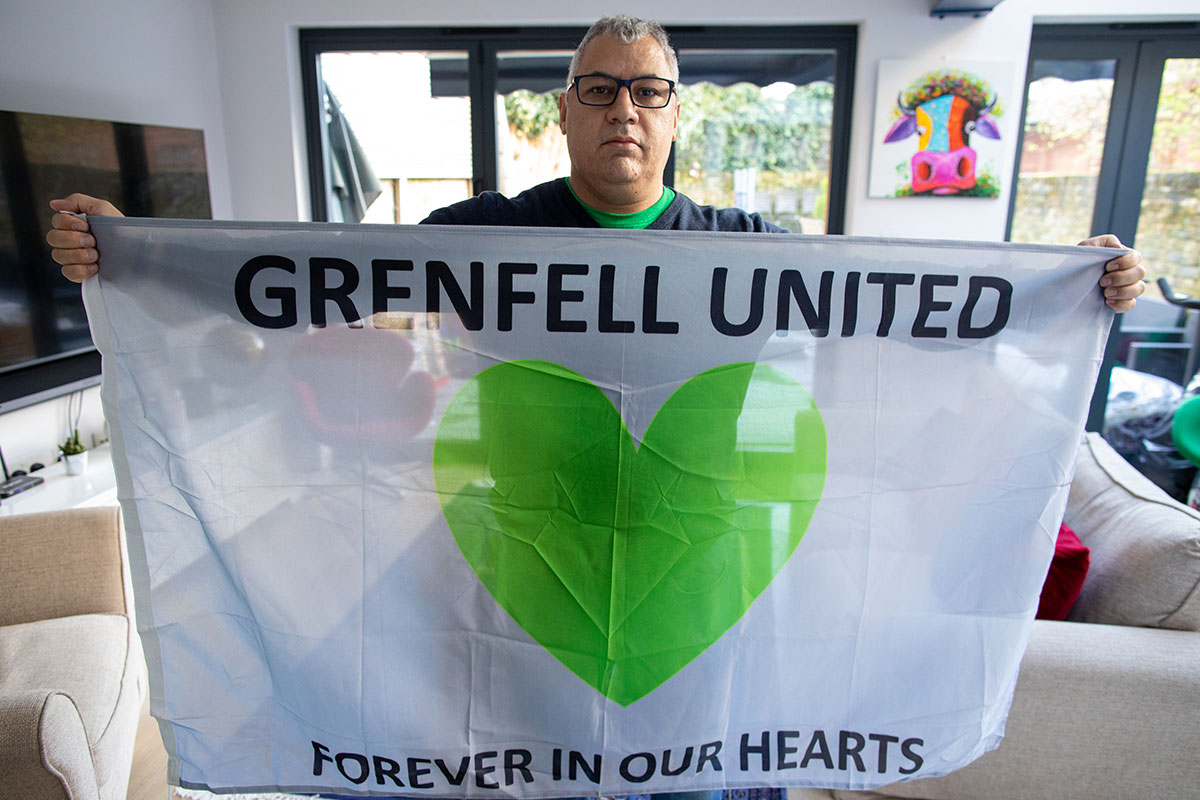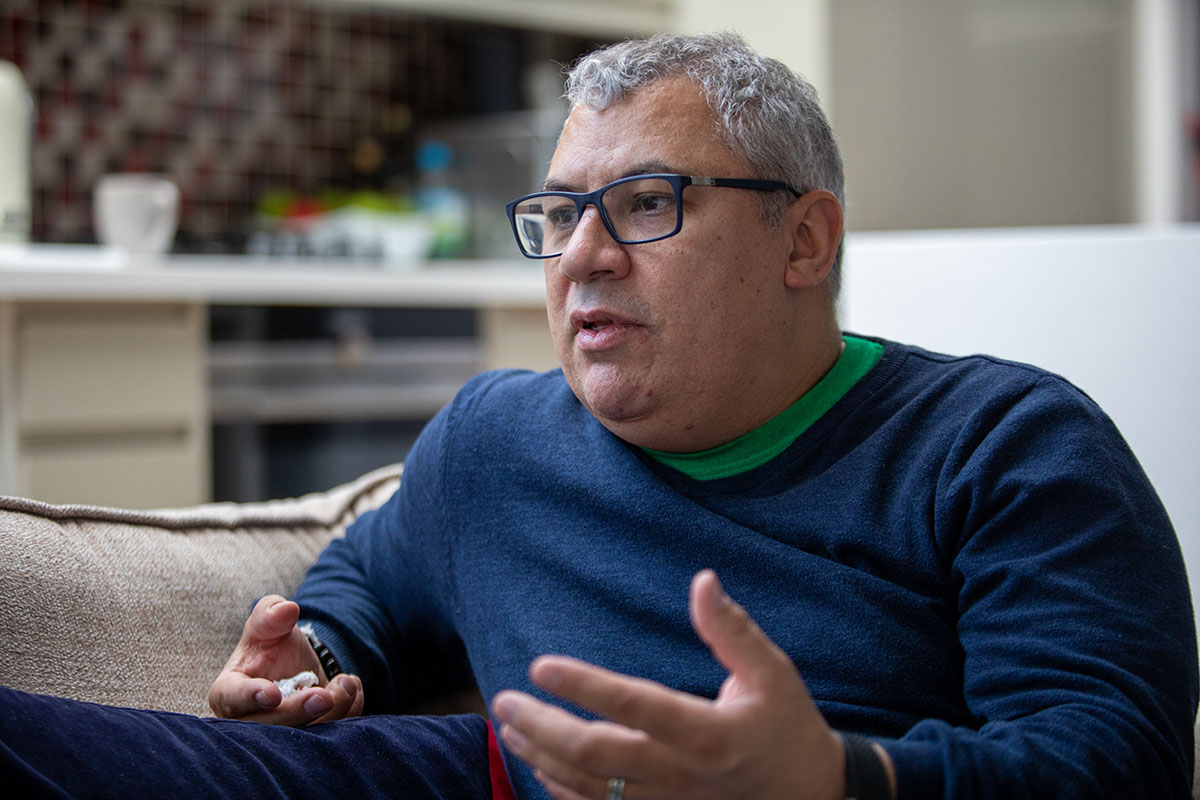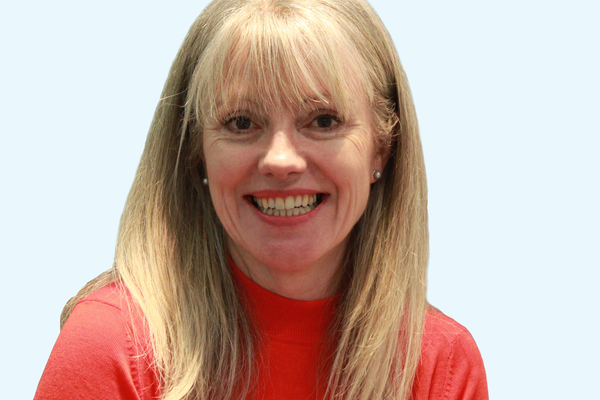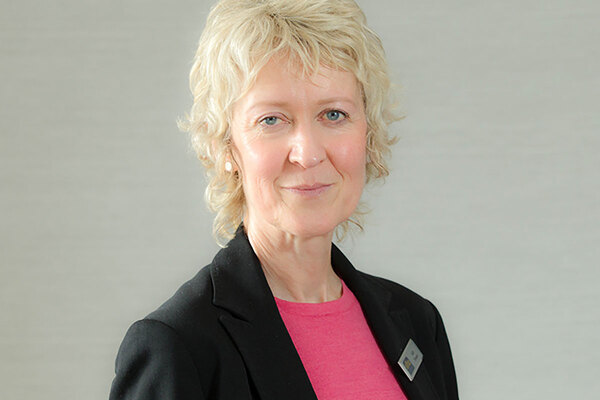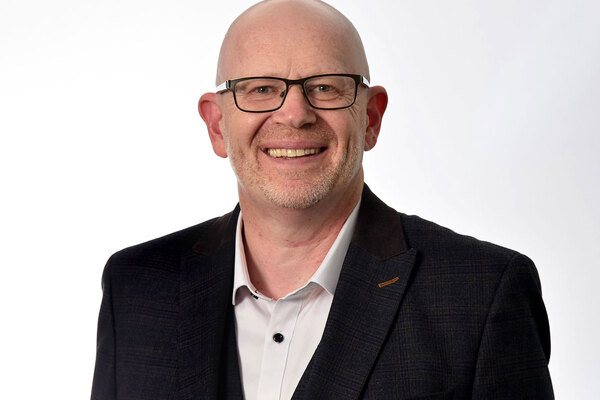‘Something has got to change’: interview with Grenfell survivor Nicholas Burton
Grenfell survivor and campaigner Nicholas Burton tells Peter Apps about his hopes after the fire. Photography by Jonathan Goldberg
Nicholas Burton has just been delivered some fragments of his former life. In a clear perspex box on his kitchen table sits a blackened laptop and a couple of equally charred memory cards. They were recovered by the Metropolitan Police from his burned flat on the 19th floor of Grenfell Tower.
Now the items sit in the open-plan kitchen and living room of his new home – a ground-floor flat in a terraced house almost a mile away from the tower. The flat is nicely furnished – Nick, 52, has laid decking in the back garden and has decorated the walls with colourful artwork. But the flat does not yet feel like home.
“I haven’t got used to being on my own,” he says. Nick’s wife, Maria ‘Pily’ del Pilar Burton, was one of the 72 victims of the fire. She died in January 2018, months after the blaze, having been in a coma for most of the time since the couple’s terrifying descent down the smoke-logged stairwell.
As well as losing his wife and his home, Nick was affected physically: for months after the blaze he had dizzy spells, a fever and a heavy cough. But over time, as his physical health has improved, he has grown into a campaigner – not only for justice for his wife and the 71 other victims, but for changes to housing market conditions, which he feels caused the Grenfell tragedy.
“My point of view: the housing market is completely broken. If you look at the skyline of London, there’s a million towers and a million cranes but it’s all profit driven”
As part of this, he has taken a prominent role in a new film, Push, which follows the work of Leilani Farha as she travels the world as the UN’s special rapporteur on adequate housing. At the heart of Ms Farha’s work is a philosophy that the marginalisation of individuals and the prioritisation of commercial interests is a global phenomenon in the housing market, one which begets human suffering – of which Grenfell was just one example. It is a philosophy that Nick shares.
“My point of view: the housing market is completely broken. If you look at the skyline of London, there’s a million towers and a million cranes but it’s all profit driven. There’s a whole generation that will never be able to earn a flat,” he says. “There are thousands of flats being developed next door to Westfield [in White City]. But they start at £725,000 for a shoebox.
“No one from the community can afford that – they are just going to be sold off in Singapore, in Hong Kong as investments. That marginalisation of the community is absolutely part of what created Grenfell.”
This feeling is rooted in his experience. He grew up in Kensington and Chelsea, not far from the Lancaster West Estate, where Grenfell Tower is located. It is a part of the world where inequality in the housing market is particularly difficult to ignore.
“Even as a kid I knew the differential between these super expensive mansions and the things I saw in our area. I remember all those, what you used to call slum housing – corrugated iron everywhere and gaps where they’d been knocked down or bombs had knocked them down during the war,” he says.
“Living in that area, there was a sense of the ‘haves’ and the ‘have-nots’. We didn’t think we were poor because everyone was the same where I lived. But if you walked up to Holland Park, where I went to school, you knew there was a big change from one road to the next and we knew we could never afford a house around here, ever.”
Nick met Pily when he was a teenager. He used to go to a Spanish disco with friends from sixth form and the party would usually end in Pily’s flat in Grenfell Tower. A relationship blossomed slowly, he moved into her flat in the 1980s and the couple bought their home through the Right to Buy in the 1990s.
But he continued to feel a sense of marginalisation – a feeling that residents of the estate were not valued by their council landlord. This, he feels, played out in the way residents were treated by the council in the years before the fire.
“Before the tower block was refurbished, the council and [managing agent Kensington and Chelsea Tenant Management Organisation] were arrogant and dismissive of us,” Nick says. “You’d go down to the town hall and they would treat you with distaste really. I’m sure if I lived in one of the mansions on a different road it would have been very different.”
A feeling grew that the estate was being “run down” – deliberately mismanaged to pave the way for an expensive regeneration that would replace it with high-density housing. “There was no care. We understood that something was going to happen and maybe we were going to lose the estate,” Nick says.
There is some evidence of this: a draft masterplan for the area commissioned by the council in 2009 advocated knocking down the estate and the tower. It said the land values in the area were “artificially depressed” by the estate and described the appearance of Grenfell Tower as a “blight”.
“Most of the existing housing in the area would be demolished to make way for a mix of new and refurbished private, intermediate and social rented homes of a range of house types,” it said.
Then came the refurbishment, the complaints from residents, the difficulties in being listened to. Nick recalls objecting to one aspect of the work, only to find that workers had come along while he was at work and done it anyway.
While there was consultation with residents, it felt as if the decisions were already taken and simply imposed on the community. “They thought, ‘we’ll have a meeting but we’ll continue with the decisions we’ve made. The meeting is just a tick-box exercise to say we have engaged with all the people’,” he says.
Then came the fire. Nick recalls that he was out walking his dog the night before and saw cars parked in front of the entrance to the building. “I said, ‘Look at those idiots over there parked by the main door. If there was a fire in the tower, how would the fire truck get in?’”
After the fire broke out, Nick had phoned 999 several times and explained that his wife – who suffered from dementia – would not be able to make it out without assistance. He was assured that firefighters would be sent to rescue them.
In the end, amid the terrible confusion about who was trapped and where, no one was sent, but the couple were eventually rescued by two firefighters who were searching for one of their neighbours. The neighbour, Debbie Lamprell, had fled to the 23rd floor, which is where she had phoned 999 from. But the rescue team did not get this information and she died.
By the time they were rescued, Nick and Pily were sheltering in their bathroom. “I didn’t really see the fire officers, I just saw an arm. I said, ‘I’ve got a dog here’ and he said, ‘I’m sorry, let’s go’. And then it was out into the darkness. I was shouting out saying ‘where’s my wife?’ and I heard a voice say ‘I’ve got her’ and that was it – out into the stairwell.”
Listen to our podcast episode featuring Nick and UN special rapporteur Leilani Farha:
Two-and-a-half years on, how does he feel towards the fire service, which was so severely criticised in the first report from the Grenfell Tower Inquiry? “You couldn’t write that report as a film,” he says. “The failings, after failings, after failings, it’s unbelievable. But my own view to the London Fire Brigade [is] I’m very grateful. The individual firefighters who went into the tower are true heroes.”
After Pily died, Nick took a break from campaigning and went travelling. He visited countries all over the world with a banner printed with a green heart and “Grenfell united. Forever in our hearts”. In each city he visited he sought out a local fire station, where he would arrive unannounced and speak about Grenfell.
“Everywhere I went, they had heard about it and they wanted to invite me in and talk,” he says. His pilgrimages were marked by a desire to make sure other fire authorities would not make the same mistakes. He would ask them what their plan was for a burning building and what sort of cladding there was on local high rises.
This global perspective has led him to the Push film and the question of the global housing crisis and what is causing it. On his coffee table sit books about housing economics and building safety.
All this is new territory for Nick. Softly spoken and simply dressed, he does not look like your typical political activist. Before Grenfell, he worked in the wine trade and then as a catering manager for west London hospitals. His interests were mainly “the great food of hospitals, good wine and Chelsea”, not the housing crisis. But what happened to his community has pushed him to call for change.
“The marginalisation of the community in North Kensington is happening everywhere. People are being pushed and pushed,” he says. “We have to start asking these questions about what is actually happening because we’re missing the big point. The elites of the world are getting so rich and people are not even people anymore. They are just something to take.”
Fighting for change to this system is part of what he means when he calls for justice for those who died at Grenfell Tower.
“Justice is different for everybody. There’s people who want people in prison. There’s people who lost their children and their families,” he says.
“But my justice is this never happening again. To put that in place, you need to fix the fire brigade. You need to tackle the construction industry. The government has got to change. We need a real rethink of what’s going on and what’s happening.
“I don’t have the answers of how to tackle this, but at least people need to ask questions and if people keep pushing and pushing…” he trails off. “It’s going to be a long road. We may not even get there in our lifetime. But something has got to change.”
Push was released on 28 February and is showing at selected cinemas nationwide
Sign up for our weekly Grenfell Inquiry newsletter
Each week we send out a newsletter rounding up the key news from the Grenfell Inquiry, along with the headlines from the week
Already have an account? Click here to manage your newsletters
